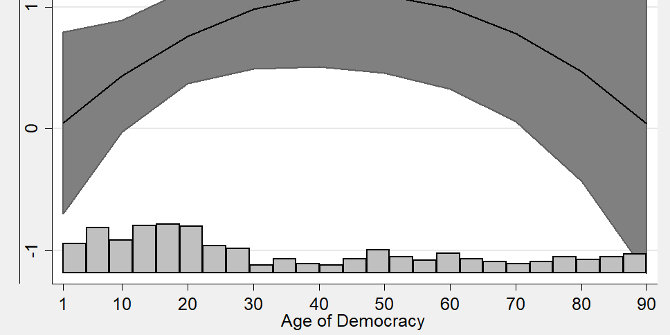 What relationship is there between economic inequality, immigration, and public support for redistributive policies? Presenting findings from a new study, Gabriele Magni writes that economic inequality triggers selective solidarity: when inequality is high, individuals grow more supportive of redistribution – but only if redistribution benefits native citizens.
What relationship is there between economic inequality, immigration, and public support for redistributive policies? Presenting findings from a new study, Gabriele Magni writes that economic inequality triggers selective solidarity: when inequality is high, individuals grow more supportive of redistribution – but only if redistribution benefits native citizens.
Economic inequality has reached its highest level in thirty years in advanced industrial societies. Inequality raises the stakes of redistribution, inasmuch as a small number of residents have a lot to lose from wealth reallocation, while an increasingly large number could benefit. At the same time, immigration has become a top political priority in many European countries. With populist parties often advocating welfare chauvinism – that is, the exclusion of immigrants from welfare benefits – immigration has become intertwined with the politics of welfare.
So how does economic inequality affect support for redistribution to native citizens and to immigrants? Prior work has shown that economic scarcity can spur hostility toward immigrants. Studies on preferences for redistribution have also examined the separate effects of inequality and immigration. While the impact of inequality is somewhat mixed, growing evidence suggests that immigration reduces welfare support. However, the interaction between inequality and immigration in affecting welfare support is not straightforward. In particular, it is not clear whether and how economic inequality affects support for immigrants.
In a recent study, I explored this question by combining the analysis of survey data from OECD countries linked to contextual socio-economic indicators with a survey experiment that I administered to a nationally representative sample of Italian citizens. This approach allowed me to evaluate welfare attitudes in a large number of countries and to identify causal effects.
My research reveals that economic inequality triggers selective solidarity. When inequality is high, individuals grow more supportive of redistribution – but only if redistribution benefits native citizens. Inequality therefore reinforces the already popular opinion that native citizens deserve welfare priority over immigrants and widens the gap between support for natives and support for immigrants. This happens because inequality erodes beliefs in the existence of economic opportunity conducive to social mobility, which in turn strengthens ingroup favouritism. In times when citizens think that external factors more than hard work determine one’s economic fate, they become more selective regarding who should receive government support – and more likely to prioritise natives.
Observational analysis: economic inequality and welfare chauvinism
How did I get to these conclusions? First, I conducted an analysis based on data from the European Social Survey, which I linked to contextual socio-economic indicators. These indicators include a measure of subnational economic inequality. Focusing on the sub-national level allowed me to account for the substantial regional differences in inequality and welfare preferences observed in many European countries. The findings show that welfare support for people in need grows when economic inequality is higher. In contrast, support for welfare redistribution to immigrants decreases under high inequality.
The negative effect of inequality on support for immigrants is substantial. The difference in support for immigrants between an average individual living in the least unequal region in Europe and an individual living in the most unequal region in Europe is similar to the difference in predicted support between an individual with the lowest level of education and an individual with the highest level of education.
This observational analysis, therefore, reveals a correlation between economic inequality, on the one hand, and two contrasting attitudes, on the other: general support for people facing economic difficulty and desire to tighten immigrant access to social benefits.
Experimental analysis: economic inequality and selective solidarity
To isolate the causal effect of inequality on welfare support for natives and immigrants, I then conducted a survey experiment. I administered the survey to a nationally representative sample of 1,275 Italian citizens. In the survey, I embedded an experiment in which I randomly assigned respondents to one of three conditions: the economic inequality treatment, the poverty treatment, or the control group. The inequality and poverty treatments primed respondents to think about inequality and poverty in Italy, respectively. Built symmetrically, they provided objective information about economic inequality and poverty in the country with bullet-point data summary, graphs, and pictures.
I then measured support for redistribution that takes away from the rich through higher taxes; and for redistribution that gives to the poor via monthly income subsidies. In the latter case, I measured support for income redistribution toward two possible groups of recipients: native Italians living in poverty and immigrants living in Italy in poverty.
Exposure to objective information about inequality significantly increases support for redistribution through higher taxes on the rich (+11 percentage points) and for income subsidies for native citizens (+7 percentage points), but does not boost willingness to help immigrants. In fact, among conservatives, inequality reduces support for subsidies for immigrants by 17 percentage points. In contrast, poverty does not significantly affect support for redistribution.
Overall, these results provide evidence that inequality increases support for redistribution, but only for policies that benefit native citizens. Economic inequality, therefore, widens the gap between welfare support for natives and welfare support for immigrants.
The mediation of perceived social mobility
Why does this happen? Inequality leads to selective solidarity by influencing a psychological component, i.e. erosion of beliefs in social mobility. Mediation analysis reveals that economic inequality – but not poverty – increases the conviction that society lacks economic opportunity. In turn, believing that society is not offering a channel for those at the bottom to improve their conditions increases support for redistribution that takes away from the rich and for welfare programmes that benefit native citizens, but decreases willingness to help immigrants through welfare support.
Conclusion and implications
Overall, my research shows that the identity divide between natives and immigrants is central under economic inequality. Inequality activates ingroup vs outgroup thinking that extends to groups other than the rich. Given the salience of immigration in the politics of welfare, immigrants are seen as a relevant outgroup who are less deserving of welfare support. As a result, inequality spurs selective solidarity that benefits only native citizens.
My research contributes to an ongoing discussion on whether economic or cultural and racial factors shape immigration attitudes and voting behaviour in support of political entrepreneurs who are hostile to immigrants. My work suggests that economic, racial and cultural factors interact in shaping political attitudes. By making group membership and identity salient, economic inequality strengthens in-group favouritism and leads to selective solidarity that penalises immigrants.
For more information, see the author’s accompanying study in the British Journal of Political Science
Please read our comments policy before commenting.
Note: This article gives the views of the author, not the position of EUROPP – European Politics and Policy or the London School of Economics. Featured image credit: Elizabeth Ellis (CC BY-SA 2.0)
_________________________________
 Gabriele Magni – Loyola Marymount University
Gabriele Magni – Loyola Marymount University
Gabriele Magni is an Assistant Professor at Loyola Marymount University.




